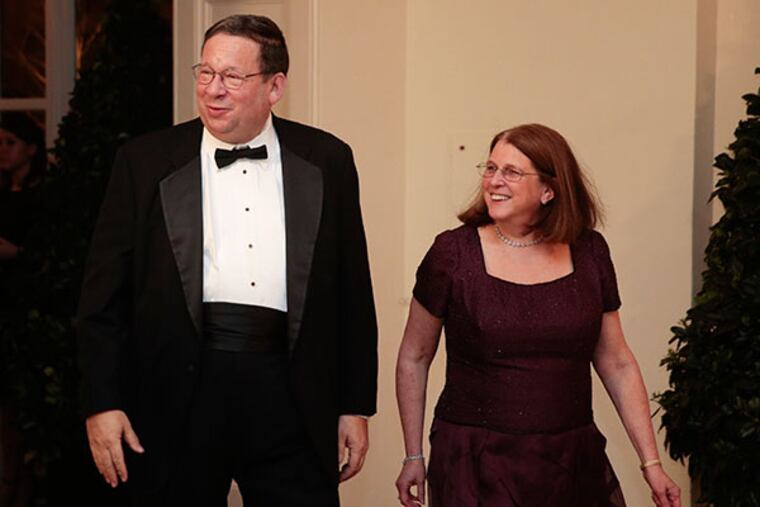Cable merger sets stage for fierce Washington lobbying
WASHINGTON - Comcast Corp.'s purchase of Time Warner Cable sets the stage for a fierce round of lobbying that will pit consumer advocates against one of the most savvy, well-connected, and deep-pocketed entities in Washington.

WASHINGTON - Comcast Corp.'s purchase of Time Warner Cable sets the stage for a fierce round of lobbying that will pit consumer advocates against one of the most savvy, well-connected, and deep-pocketed entities in Washington.
Almost as soon as the deal was announced Thursday, consumer groups blasted the notion of Comcast - a giant in cable, Internet, and programming - growing even larger.
"This is so over the top that it ought to be dead on arrival," said Michael Copps, a former Federal Communications Commission member who now works with the watchdog group Common Cause. Copps was the only FCC commissioner who voted against Comcast's last big move, its merger with NBCUniversal.
Craig Aaron, head of Free Press, a consumer-advocacy group, said the deal would create "the cable guy on steroids" and lead to higher prices.
"No one woke up this morning wishing their cable company was bigger or had more control over what they could watch or download. . . . Stopping this kind of deal is exactly why we have antitrust laws," he said in a news release.
Comcast executives said the deal would prove a boon for consumers and would not reduce competition, because the companies' markets don't overlap. People who rely on Time Warner Cable for TV or Internet service, they said, will have the same number of choices as before.
"It's pro-competitive, strongly in the public interest, and, we believe, approvable," Comcast chief executive Brian Roberts told reporters in a conference call. "We have no business overlap, there's no reduction in competition."
Comcast, Roberts said, will offer improved products to Time Warner customers and gain the national scale to spur investment in new products.
The deal will come under formal scrutiny on two fronts. Antitrust regulators - either the Department of Justice or Federal Trade Commission - will examine it to determine if it unfairly inhibits competition.
The FCC has a more broad purview. It will review whether the deal is in the public interest. If it approves the merger, it could impose conditions to ensure competitiveness, as it did in the Comcast-NBCUniversal deal.
The FCC review is also done largely in public, while the antitrust review is more secretive.
The process will take months, at least, and will be intensely scrutinized.
Congress does not have a formal role, but lawmakers will make their voices heard in press releases, letters, and hearings.
"Congress becomes sort of a bully pulpit and a barometer," said Harold Feld, senior vice president at Public Knowledge, which advocates for open Internet access and has criticized the deal.
Comcast has a reputation as one of Washington's most effective operators. The company spent $18.8 million on lobbying in 2013, more than all but six businesses or trade groups, according to the Center for Responsive Politics. It spent more than Google, General Electric, or ExxonMobil.
Roberts is often called to White House events featuring business leaders, and Comcast executive Vice President David L. Cohen is ubiquitous. He was on the guest list this week for a state dinner with French President François Hollande.
Its lobbying force of more than 100 includes Meredith Baker, a former FCC commissioner who joined the company four months after voting in favor of its merger with NBC.
Sen. Amy Klobuchar (D., Minn.), chair of the subcommittee that oversees antitrust issues, said she planned to hold hearings to examine the deal's impact on "consumers and competition."
Sen. Robert P. Casey Jr. (D., Pa.) praised the merger for its potential to generate jobs in Pennsylvania.
"Comcast is a world-class company and responsible corporate citizen," he said in a statement.
Casey received more donations from Comcast than any other congressional candidate in the 2012 election cycle, according to the Center for Responsive Politics.
"It's likely that it does get approved," said Kevin Martin, a former FCC chairman who now works as an attorney for Bloomberg, which has battled Comcast in court. "There isn't much overlap in terms of the competitive effects."
Seth Bloom, the former general counsel for the Senate's antitrust subcommittee, agreed, but added, "That isn't to say there's no antitrust issues, because there are."
The FCC has more discretion on the deal and is "a wild card" in the process, Bloom said.
While the deal is between two companies long known for their reach in the cable world, Internet access could be just as critical a topic for review, said Kevin Werbach, a professor at the Wharton School of the University of Pennsylvania and a former FCC adviser.
"I don't think anyone thinks that a deal like this is purely about cable television. It's about being a powerful digital platform," said Werbach, who is on the board of Public Knowledge, one of the groups opposed to the merger.
A key question is whether Comcast, as it develops Internet-based products, will hinder competitors or stifle new companies that also rely on Internet service.
The recent history of major telecommunications mergers is mixed. The Obama administration approved the Comcast-NBC union in 2011, but blocked a proposed AT&T deal with T-Mobile that same year. Neither presents a perfect comparison to Comcast-Time Warner.
Werbach said, "I wouldn't bet against the deal going through."